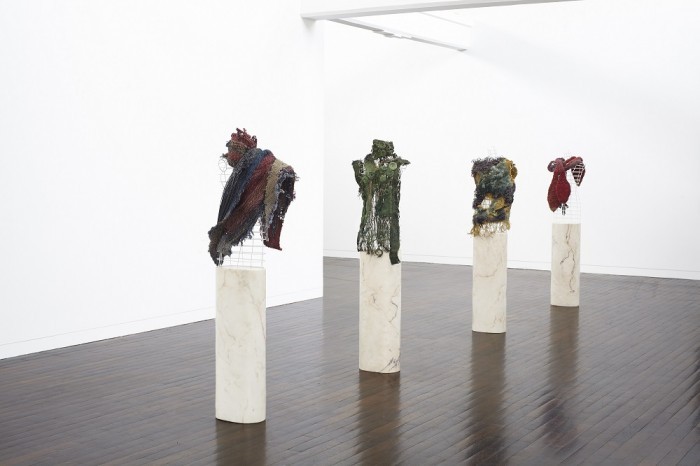Paulina Olowska
31 May - 20 Sep 2015
Needle / Nadel
Aachen Art Prize 2014
31 May - 20 September 2015
Paulina Olowska is to receive the Aachen Art Prize for 2014. In celebration of the award Olowska will develop a site-specific exhibition project at the Ludwig Forum für Internationale Kunst.
In her artistic work Paulina Olowska trawls the historical sources of Modernism, delves into art and design history, and draws on fashion and advertising. Fascinated by the utopian promise articulated in the historical avant-garde, Olowska adopts and makes use of their techniques. She thus works in a variety of media, such as performance, video, sculpture, painting, and fashion, while also curating exhibitions or organizing events. In the process, forgotten women of bygone eras once again come under the spotlight, reappraised by Olowska and repositioned historically. She raises the issue of how we read, appraise and negotiate history, and thus the present.
Exploring the idea of production, both industrial and artistic, the show Needle/Nadel addresses fragmented processes by which an artwork comes to be. Olowska combines disparate sources, merging found material, applied arts, and cast-off or recycled elements from factory production together within her own painting and sculpture. Culling from high and low materiality, sculptures may juxtapose marble, metal and pieces of 1960s tapestry. The exhibition structures an interplay between positive and negative, showing the gaps and by-products of artworks in formation.
The title Needle/Nadel plays with the history of the building and the crafts connected with it. Once the production facility for the world’s largest umbrella factory, its central manufacturing hall filled with working women, Ludwig Forum today displays international art.
In this industrial context of the past, Olowska’s work negotiates ideas about craft, labor and the fragile moment of an artwork’s creation. Thus, the exhibition offers insight into several of Olowska’s emblematic themes like feminism, fashion, and a critical nostalgia. Thus, the exhibition is following several of Olowska’s emblematic themes such as genderism, fashion and critical nostalgia, which revels in history while simultaneously questioning and negotiating the interpretation of history, and thereby also the present.
Paulina Olowska, born in 1976 in Gdansk, studied at the School of the Art Institute of Chicago and the Academy of Fine Arts, Gdansk. She lives and works near Krakow. Olowska can look back at a series of solo shows in some of the most renowned museums for contemporary art worldwide, most recently in the Kunsthalle Basel (2013), the Stedelijk Museum, Amsterdam, in MoMA, New York (2012), and Munich’s Pinakothek der Moderne (2009). Her work has featured in a host of group exhibitions, for example in the Museum of Modern Art, Warsaw, the Sammlung Goetz, Munich, in the Carnegie Museum of Art, Pittsburgh, and in the Museum Folkwang, Essen.
The Aachen Art Prize is awarded biannually to an artist whose works have had a formative influence on the international art scene. The Aachen Art Prize is donated by the Freunde des Ludwig Forums für Internationale Kunst e.V. and is enabled by cooperation with the City of Aachen and Aachen trade and industry. The award includes prize money of 10.000 Euros and is connected with a solo exhibition in the Ludwig Forum. In 2014 it is supported by Culture.pl, BMW Group Munich, Rhein-Nadel Automation GmbH, Sparkasse Aachen and others.
Jury of the Aachen Art Prize 2014: Dr. Sabine Breitwieser, director Museum der Moderne, Salzburg; Dr. Ulrike Groos, director Kunstmuseum Stuttgart; Dr. Brigitte Franzen, director Ludwig Forum, Aachen; Ernst Höhler, chairman of the Verein der Freunde des Ludwig Forums e.V..
Past winners of the Aachen Art Prize: Phyllida Barlow (2012), Pawel Althamer (2010), Aernout Mik (2008), Roman Signer (2006), Andreas Slominski (2004), Tacita Dean (2002), Michael Asher (2000), Richard Tuttle (1998), Katharina Fritsch (1996), Christian Boltanski (1994), On Kawara (1992), Ilya Kabakov (1990), Richard Long (1988), A.R. Penck (1985), and Luciano Fabro (1983).

